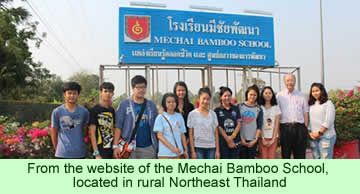One of Thailand’s daily newspapers, The Nation, published a story last week about the Mechai Bamboo School, an innovative institution which is mostly run by the students. The students select the incoming applicants, hire the teachers, promote patterns of community service, and foster student enterprises. They are involved with such school business issues as purchases, procurements, and audits.
 According to the article, the students do not pay any tuition. Instead, they and their parents—many of whom are local farm workers—pay by planting trees to help restore the natural environment of the community. The students and their parents also split half and half the responsibility of performing 800 hours of community service. The school is intended to serve as a model for education in Rural Thailand.
According to the article, the students do not pay any tuition. Instead, they and their parents—many of whom are local farm workers—pay by planting trees to help restore the natural environment of the community. The students and their parents also split half and half the responsibility of performing 800 hours of community service. The school is intended to serve as a model for education in Rural Thailand.
The Mechai Bamboo School, located in Buriram Province of northeastern Thailand, tries to be a lifelong learning center for all members of the community. Its curriculum includes not only the typical subjects taught to secondary level students but also practical, occupational programs such as water purification, preventive heath techniques, solar energy development, family planning, agricultural subjects, and information and communication technology.
Instruction in information technology is at the core of the curriculum. Careers in information and communications technology, people at the school believe, are the best ways to bridge the digital divide and to offer employment opportunities for rural people.
In order to achieve this aim, the Bamboo School has forged a partnership with Microsoft to provide Internet-based educational programs and to expose students to technological possibilities. Volunteers from the company instruct the teachers and students in uses of their software so they can share their work in the cloud and expand the horizons of participants beyond their rural classrooms.
The school participates in Microsoft’s Partners in Learning program, through which teachers and students are able to access resources that give them training in useful skills. Students are using the technology to help create new products. The school, and the corporation, work with an association of educational institutions in the country to spread the model widely.
The intent is for the school, partnering with Microsoft, to act as mentors to develop the uses for technology in other schools in Thailand. At this point, the Mechai Bamboo School is seeking to develop comparable technological effectiveness programs in 46 schools in the upcoming year. It has a goal of reaching 150 schools over the next three years. IKEA, the furniture conglomerate based in Sweden, and the Ikano Group, another European corporation, are providing financial support.